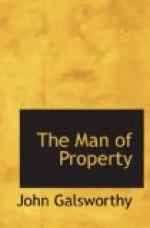“By their sense of property. A Forsyte takes a practical—one might say a commonsense—view of things, and a practical view of things is based fundamentally on a sense of property. A Forsyte, you will notice, never gives himself away.”
“Joking?”
Young Jolyon’s eye twinkled.
“Not much. As a Forsyte myself, I have no business to talk. But I’m a kind of thoroughbred mongrel; now, there’s no mistaking you: You’re as different from me as I am from my Uncle James, who is the perfect specimen of a Forsyte. His sense of property is extreme, while you have practically none. Without me in between, you would seem like a different species. I’m the missing link. We are, of course, all of us the slaves of property, and I admit that it’s a question of degree, but what I call a ‘Forsyte’ is a man who is decidedly more than less a slave of property. He knows a good thing, he knows a safe thing, and his grip on property—it doesn’t matter whether it be wives, houses, money, or reputation—is his hall-mark.”
“Ah!” murmured Bosinney. “You should patent the word.”
“I should like,” said young Jolyon, “to lecture on it:
“Properties and quality of a Forsyte: This little animal, disturbed by the ridicule of his own sort, is unaffected in his motions by the laughter of strange creatures (you or I). Hereditarily disposed to myopia, he recognises only the persons of his own species, amongst which he passes an existence of competitive tranquillity.”
“You talk of them,” said Bosinney, “as if they were half England.”
“They are,” repeated young Jolyon, “half England, and the better half, too, the safe half, the three per cent. half, the half that counts. It’s their wealth and security that makes everything possible; makes your art possible, makes literature, science, even religion, possible. Without Forsytes, who believe in none of these things, and habitats but turn them all to use, where should we be? My dear sir, the Forsytes are the middlemen, the commercials, the pillars of society, the cornerstones of convention; everything that is admirable!”
“I don’t know whether I catch your drift,” said Bosinney, “but I fancy there are plenty of Forsytes, as you call them, in my profession.”
“Certainly,” replied young Jolyon. “The great majority of architects, painters, or writers have no principles, like any other Forsytes. Art, literature, religion, survive by virtue of the few cranks who really believe in such things, and the many Forsytes who make a commercial use of them. At a low estimate, three-fourths of our Royal Academicians are Forsytes, seven-eighths of our novelists, a large proportion of the press. Of science I can’t speak; they are magnificently represented in religion; in the House of Commons perhaps more numerous than anywhere; the aristocracy speaks for itself. But I’m not laughing. It is dangerous to go against the majority and what a majority!” He fixed his eyes on Bosinney: “It’s dangerous to let anything carry you away—a house, a picture, a—woman!”




